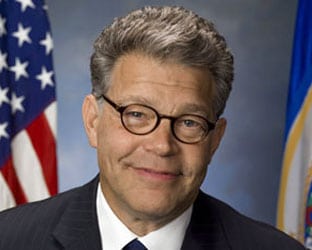 Sen. Al Franken (D-MN) used to get a paycheck from NBC, but since he’s gotten a high-profile gig on Capitol Hill he has been no fan of its current incarnation as Comcast/NBCUniversal. And he doesn’t want it taking on a new bride. Others agree.
Sen. Al Franken (D-MN) used to get a paycheck from NBC, but since he’s gotten a high-profile gig on Capitol Hill he has been no fan of its current incarnation as Comcast/NBCUniversal. And he doesn’t want it taking on a new bride. Others agree.
Stated Franken, “Comcast’s proposed acquisition of Time Warner Cable would position Comcast as a veritable gatekeeper over vast swaths of the nation’s telecommunications industry, resulting in higher prices, fewer choices, and worse service for consumers in Minnesota and across the country. The proposed acquisition also would threaten innovation and economic activity on the Internet, and it would jeopardize the free flow of information and ideas on which our democracy depends. Because the proposed acquisition does not advance the public interest—but, rather, is inimical to it—it must be rejected.”
Viamedia, an advertising service for Small & Mid-Sized Cable Operators, is also none too happy about the proposed merger. IN comments to the FCC, it said, “Comcast’s acquisition of TWC would result in control of approximately $4.5 billion of the $5.4 billion national Spot Cable Advertising market. The consolidation would result in one less Spot Cable Advertising Representation firm in many U.S. markets and would adversely affect small businesses that place Spot Cable Advertising by increasing advertising rates. These increased rates ultimately harm American consumers as advertisers are forced to pass along the higher cost for advertising.”
Added Viamedia President/CEO Mark Lieberman, “We are big proponents of the power of Spot Cable Advertising and the original construct of NCC for national advertisers, Interconnects for regional advertisers and third party representation for local advertising. However, our concern is that this foundation for cable advertising is fast becoming the springboard for the future of all of TV advertising and will be controlled by one company. We’re asking the FCC to take a close look at the Comcast-TWC deal and make vital changes to avoid serious harm to smaller cable companies, local advertisers and consumers.”
A consumer watchdog known as, well, Consumer Watchdog, checked in against the merger. “The consolidation of the largest cable television providers would create a media juggernaut that would stifle completion and hurt consumers who would ultimately pay higher prices for even worse service,” wrote John M. Simpson, Consumer Watchdog’s Privacy Project Director. “By controlling the means of distribution via cable TV or the Internet, Comcast will be able to unfairly promote its content over the content of other providers, limiting choice for consumers. With its deal with Netflix to expedite the popular service’s video, there are already troubling signs that Comcast is using its power unfairly to hurt content providers and limit consumers’ choice on the Internet. The Netflix deal also breaches commitments Comcast made when that merger was approved to maintain net neutrality. It is a clear that Comcast’s pledges are quickly ignored in the face of a drive to increase profits and that behavioral conditions do not work.”
Also weighing in on the marriage is the National Hispanic Media Coalition, although its call was not for denial or specific conditions, but rather for very close regulatory scrutiny of the deal with the needs of Hispanic stakeholders protected. NHMC EVP/General Counsel Jessica J. González said, “This particular transaction is of great importance to Latinos, as its completion would make Comcast the cable provider for up to 90% of Latino video subscribers nationwide. Not only would this subject a large percentage of Latinos to Comcast’s prices and business practices, but it would also make Comcast the main gateway that many independent content producers would need to access to reach the growing Latino market. This could have major implications for Latino consumers and content creators alike.”




